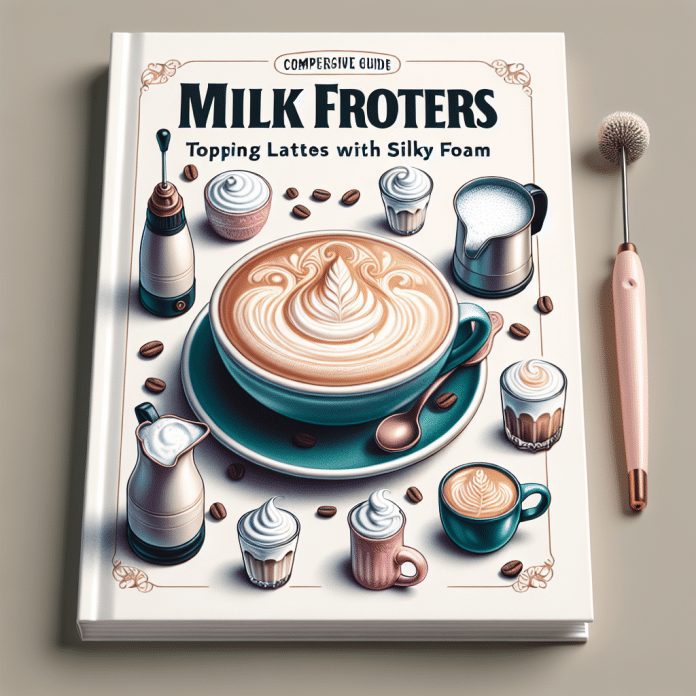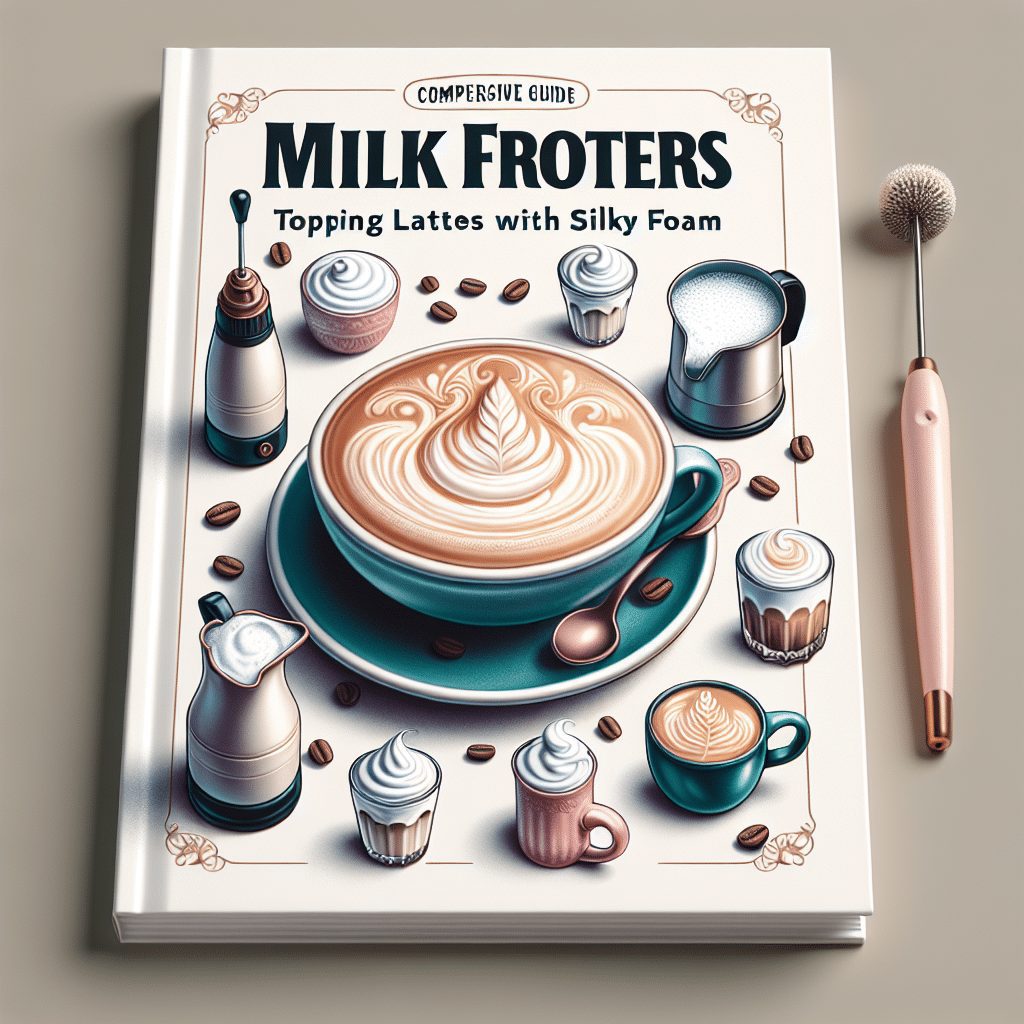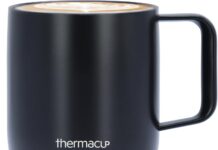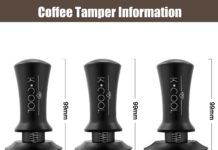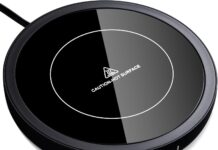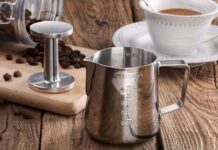In the world of coffee aficionados and latte lovers, there’s one thing that can truly make a morning cup of joe or an afternoon pick-me-up truly exceptional: silky foam. And the secret behind achieving that perfect froth is none other than a trusty milk frother. These compact and powerful devices are designed to whisk milk into a cloud-like froth, adding a touch of luxuriousness to your beloved latte. Whether you prefer a classic cappuccino or a velvety flat white, a milk frother is the ultimate tool for elevating your coffee experience to new heights. Today, we’re diving into the world of milk frothers, exploring their benefits, features, and how to choose the perfect one for your brewing needs. So grab your favorite mug, and let’s get frothing!
Types of Milk Frothers
When it comes to topping off our lattes with that perfect creamy foam, milk frothers are an essential tool. They come in various types, each with its own unique features and benefits. In this article, we will explore the three main types of milk frothers: manual frothers, electric frothers, and steam wand frothers. By understanding how each type works and considering the factors that are important to us, we can find the perfect milk frother to suit our needs.
Manual Frothers
Description
Manual frothers are simple and straightforward devices that require a bit of manual effort to achieve a frothy texture. They usually consist of a glass or stainless steel container with a plunger and a mesh screen. These frothers are often compact in size and are great for those who enjoy frothing milk on-the-go or who have limited countertop space.
How They Work
To use a manual frother, we first pour cold milk into the container, typically filling it about halfway. Next, we warm the milk by placing the frother in the microwave or on the stovetop. After heating, we insert the plunger and pump it vigorously for about 30-60 seconds, creating froth through aeration. The mesh screen helps to create a smooth and consistent texture.
Pros and Cons
One of the advantages of manual frothers is their simplicity and portability. They do not require any electricity to operate and can be taken anywhere with ease. Additionally, manual frothers are often more affordable compared to their electric counterparts. However, they do require some effort to use and may not provide the same level of froth consistency as electric or steam wand frothers.
Electric Frothers
Description
Electric frothers, as the name suggests, are powered by electricity and offer a more convenient and automated frothing experience. These machines typically consist of a base unit with a motor, a milk container, and a whisk attachment. With a variety of sizes and styles available in the market, electric frothers are suitable for both personal use and commercial settings.
How They Work
Using an electric frother is a breeze. We simply pour the desired amount of cold milk into the milk container and secure it onto the base unit. The electric motor then engages the whisk, rapidly rotating it to create microbubbles in the milk. This process aerates the milk, resulting in a creamy and velvety foam.
Pros and Cons
Electric frothers offer convenience and consistency. They require minimal effort to operate, as everything is mostly automated. With just a push of a button, we can enjoy beautifully frothed milk in no time. Electric frothers also tend to produce more foam compared to manual frothers, making them ideal for those who enjoy larger quantities of frothed milk. However, they can be more expensive than manual frothers, and their larger size may take up more space in the kitchen.
Steam Wand Frothers
Description
Steam wand frothers are commonly found in professional coffee machines and coffee shops. They provide baristas the ability to create dense, creamy, and textured milk foam for latte art. Steam wand frothers are typically built into espresso machines and require some skill and practice to master.
How They Work
The steam wand frother is a long metal tube that is attached to the espresso machine. It produces steam by rapidly heating water, which is then directed through the wand. By positioning the wand just below the surface of the milk, steam is introduced, heating and frothing it simultaneously. The barista can control the amount of froth created by adjusting the positioning of the wand and the duration of steam injection.
Pros and Cons
The main advantage of steam wand frothers is their ability to create dense and textured foam with exceptional precision. With practice, baristas can achieve latte art-worthy foam that is creamy and visually appealing. However, steam wand frothers require more skill and experience to operate compared to manual or electric frothers. They are also typically only found in high-end espresso machines, making them less accessible for home use.
Factors to Consider When Choosing a Milk Frother
Now that we have a basic understanding of the three main types of milk frothers, let’s explore some important factors to consider when choosing the right milk frother for our needs.
Frothing Capacity
The frothing capacity of a milk frother refers to the maximum amount of milk it can froth at once. Consider how much frothed milk you typically enjoy in a single serving and choose a frother with a suitable capacity. If you often entertain guests or have a large household, a frother with a larger capacity may be more practical.
Ease of Use
For many of us, simplicity and ease of use are crucial factors when selecting a milk frother. Consider how intuitive the operation is and whether the frother offers any additional features that enhance the user experience. A frother with easy-to-understand controls and clear instructions can make the frothing process a breeze.
Cleanup and Maintenance
Nobody wants to spend excessive time cleaning and maintaining their milk frother. Look for frothers with removable parts that can be easily washed or placed in the dishwasher. Some frothers also come with self-cleaning functions, which can save time and effort.
Price Range
The price range of milk frothers varies greatly, depending on the type and brand. Consider your budget and the features you prioritize to find a frother that offers the best value for your money. It’s important to note that high-end models may come with additional features or higher durability but may not always be necessary for simple frothing needs.
Durability
Investing in a durable milk frother ensures it will withstand daily use and last for a long time. Consider the quality of materials used in the construction of the frother and read customer reviews to get an idea of its longevity. A frother made with sturdy materials is less likely to break or malfunction, providing us with consistent frothing performance over time.
Frothing Capacity
Understanding Different Capacities
Milk frothers come in a range of capacities, from small individual frothers to larger models designed for multiple servings. Understanding the different capacities available will help us determine which size is right for us. Individual frothers typically have a capacity of around 8-12 ounces, suitable for frothing milk for a single serving. For those who enjoy sharing their frothy creations with others, larger frothers with capacities of 16-32 ounces or more may be more suitable.
Choosing the Right Capacity for Your Needs
To choose the right frothing capacity, consider your usual serving size and how many people you typically serve. If you enjoy a single latte or cappuccino each morning, a smaller capacity frother should be sufficient. However, if you often host brunches or gatherings where multiple people will be enjoying frothed milk, a larger capacity frother will save time and effort by frothing a larger volume in a single batch.
Ease of Use
Simplicity of Operation
The ease of use of a milk frother greatly impacts our overall experience. Look for frothers with intuitive controls and clear instructions. Models with simple buttons or switches for frothing and heating functions are user-friendly and eliminate any confusion or guesswork. The operation should be straightforward, allowing us to achieve the desired froth consistency without hassle.
Control Options
Some milk frothers offer additional control options to customize the frothing process. This may include temperature settings, froth density adjustments, or different frothing modes. If you prefer to have more control over the frothing process, look for frothers with these extra features. However, if simplicity is your priority, a basic frother with fewer control options may be sufficient.
Time and Effort Required
Consider how much time and effort is required to achieve the desired milk froth. Manual frothers, although requiring some physical effort, can be quick to use. Electric frothers tend to be more convenient, as they handle the majority of the frothing process automatically. Steam wand frothers require the most practice and skill but offer the highest level of control, resulting in beautifully textured foam.
Cleanup and Maintenance
Removable Parts
A crucial aspect of milk frother maintenance is the ease of cleaning. Look for frothers with removable parts, such as the milk container or whisk attachment, that can be easily washed under running water or in the dishwasher. Removable parts make it easier to access every nook and cranny, ensuring thorough cleaning.
Dishwasher Safe
If you prefer the convenience of using a dishwasher, check if the frother and its components are dishwasher safe. Many frothers, especially electric ones, have removable parts that are specifically designed for dishwasher use. This eliminates the need for manual cleaning and saves time and effort.
Cleaning Instructions
It’s important to follow the manufacturer’s cleaning instructions to maintain the performance and longevity of the milk frother. Some frothers come with specific cleaning solutions or descaling agents to remove any milk residue or limescale buildup. Regular cleaning and descaling help prevent clogs and ensure consistent frothing results.
Price Range
Entry-Level Frothers
Entry-level milk frothers are often affordable and offer basic frothing functionality. These frothers are suitable for those who are new to frothing or have a limited budget. While they may lack advanced features or extra durability, they still provide a good introduction to the world of frothed milk.
Mid-Range Frothers
Mid-range frothers offer a balance between price and features. They often come with additional functionalities, such as adjustable temperature settings or different frothing modes. These frothers are suitable for those who want more control over the frothing process without breaking the bank.
High-End Frothers
High-end frothers are usually found in commercial settings or for coffee enthusiasts who prioritize top-quality frothing performance. These frothers may come with advanced features, such as precise temperature control, multiple frothing options, or high-capacity containers. While they can be more expensive, they often offer enhanced durability and professional-grade frothing results.
Descale Regularly
Understanding Limescale
Limescale is a common issue faced by milk frother owners, especially those using steam wand frothers or frothers with heating elements. Limescale is the mineral buildup that occurs when water evaporates and leaves behind calcium and other minerals. Over time, limescale can clog the frother and affect its performance.
Using Descaling Solutions
To prevent limescale buildup and ensure the longevity of the milk frother, it’s important to regularly descale it. Many frothers come with descaling instructions and may recommend specific descaling solutions. These descaling solutions often contain citric acid or another mild acid that helps dissolve limescale. Following the manufacturer’s instructions and descaling recommendations will keep the frother in optimal condition and maintain its frothing performance.
In conclusion, milk frothers come in various types, each with its own features and benefits. Manual frothers offer simplicity and portability, electric frothers provide convenience and consistency, and steam wand frothers allow for precise frothing for latte art. When choosing a milk frother, factors such as frothing capacity, ease of use, cleanup and maintenance, price range, and durability should be considered. By understanding these factors and selecting the right milk frother for our needs, we can enjoy delicious and frothy milk creations with ease.


